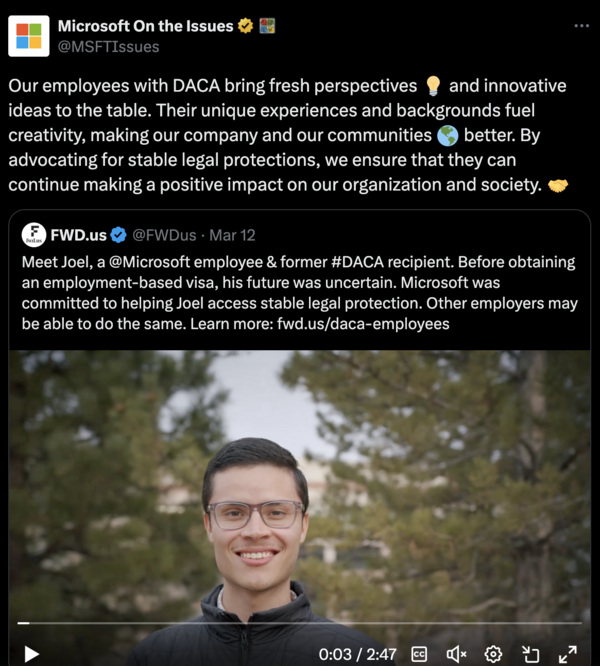Supporting DACA Employees: Recommendations for Businesses
Under the latest court orders, current DACA recipients’ work authorizations remain valid, and they can continue to renew their DACA protections. This means that they can continue to work. “Advance Parole” travel also remains an option for DACA recipients.
Knowing that DACA could end in the near future, employers should consider the following steps to help DACA employees maintain their DACA protections and to potentially secure more stable immigration protections:
- Provide access to legal consultations for DACA employees.
- A legal consultation with a knowledgeable and qualified lawyer can help DACA recipients discover if they are already eligible for an immigration benefit or pathway to legal status that they might not have considered or been aware of, and will determine what steps are needed to access any available pathways and protect against unintended legal consequences.
- Qualified immigration attorneys, in partnership with DACA recipients and their employers, can determine if the employee is a good fit for any of the options below, including employer sponsorship or Advance Parole.
- Sponsor DACA employees for permanent or temporary work visas.
- In certain, limited circumstances, some DACA recipients may be eligible to access a legal status through their employer’s sponsorship of a temporary work visa or a green card.
- In June 2024, the federal government issued new guidance to streamline the temporary work visa process and access to “D-3 waivers” for certain immigrants, including DACA recipients and Dreamers, who have earned degrees at U.S. colleges and universities. Sponsoring an employee for a temporary work visa could unlock this pathway for them.
- Support advance parole opportunities for DACA employees.
- Traveling with advance parole, can unlock existing pathways to more permanent protection for some DACA recipients.
- Businesses can assist employees seeking to utilize advance parole (for education, employment, or humanitarian reasons) by providing travel opportunities and support in the application process.
- Track and fund renewals for DACA recipient employees who are eligible, and encourage them to renew as soon as possible.
- United States Citizenship and Immigration Services (USCIS) encourages DACA recipients to submit their renewal requests four to five months before the expiration date.
- A full DACA renewal filing, including biometrics and work authorization application, costs $575 if filed online, or $625 if filed by paper, not including preparation costs (legal consultation, postage, and other materials).
- Resources, including a Legal Service Directory, are available to help with the DACA renewal process at InformedImmigrant.com.
- As an employer, you can contact your U.S. Senator or Representative, with your employee’s written consent, and request that they ask USCIS to expedite the EAD request. While USCIS does not currently process formal expedite requests from DACA requestors, it is our understanding that USCIS may still consider circumstances—such as those described on USCIS’ expedite request webpage—that warrant more expeditious processing.
- If your employee has not yet filed their renewal DACA request, you can provide a letter of support explaining the exigent circumstances for your company, again in line with USCIS’ criteria, that warrant expedited processing. These details should also be included as part of the cover letter of the employee’s filing.
- Please note that employees have no legal obligation to inform you of the expiration date on their EAD.
More Details on Employee Sponsorship
You may be able to sponsor an employee with DACA for an employment-based green card or temporary work permit. A green card, or “immigrant visa,” offers permanent legal status and a pathway to citizenship; a “nonimmigrant visa” offers only temporary protections, but could open options to adjust to a permanent status in the future.
Depending on the employee’s occupation, skills, education, and immigration history, they could qualify to be sponsored for one of many employment-based immigration categories. One of the most common is to sponsor an employee for a permanent employment-based visa, commonly called a green card.
Another possibility is a temporary work visa, which grants work authorization and legal status for a limited period of time. Some common examples include the H-1B visa for jobs requiring a specific degree in a specific field (like a teacher with an education degree or an engineer working in a STEM field), a TN “NAFTA professional” visa (for Canadian and Mexican nationals working in certain industries), or the O-1 “extraordinary ability” visa. Recent updates to the D-3 Waiver process could help DACA recipients access these visas despite complications in their immigration history.
More Details on Advance Parole
Advance parole allows certain noncitizens inside the U.S. to travel abroad temporarily and reenter the U.S. That authorization is provided before leaving, and on return, individuals are paroled back into the U.S. without changes to their status. To travel abroad using advance parole, DACA recipients must have:
After an individual applies and is approved for advance parole, USCIS issues an advance parole travel document to travelers before they depart the U.S.
Critically, advance parole can eliminate certain legal barriers for undocumented individuals hoping to adjust their immigration status. Many DACA recipients are unable to adjust their status from within the U.S. if they originally entered without authorization. Current legal barriers require many DACA recipients to leave the country and wait many years before they can apply for a visa at a consulate or embassy abroad and re-enter with a new status, like an employment-based green card.
Using advance parole to leave the country and reenter with formal inspection—a legal requirement to adjust status from within the U.S.—could open up existing or future pathways for these individuals to adjust their status without leaving, or to pursue new immigration protections while they stay in the U.S.
Additional Employee Support
For more detailed ways to support your DACA employees in the everyday work environment, please review the suggestions and resources below:
- Offer immigration legal assistance/counsel for immigration-impacted employees, contractors, and family members of employees, including spouses, parents, siblings, etc.
- We recommend using outside counsel to avoid potential conflicts of interest.
- An initial screening with an attorney could help determine if an employee already qualifies for a legalization pathway even if they don’t know about it yet, such as 245(i) adjustment.
- Other assistance can include supporting legal defense for employees who are detained or encounter other legal troubles arising from losing protections.
- Arrange employee-centered, supportive offboarding programs for employees who are forced to leave the workplace because they are unable to renew their work authorization or their work authorization lapses while their renewal filings are pending.
- Review existing company policies to determine if affected employees can receive separation benefits, including accrued sick leave, vacation leave balances, and continuation of health benefits.
- Consider what health care benefits can be extended despite termination.
- If your company has an employee assistance program (EAP), remind immigration-impacted employees of available mental health resources.
- If your company does not already have existing EAPs in place, make a list of in-network mental health service providers for easy access, and if superior options are offered only out of network, cover the difference.
- Host a regular call with senior management, HR, and directly affected individuals to ensure that the company is being attentive to employees’ needs.
- Host Know Your Rights (KYR) trainings during work hours for all staff that cover an individual’s rights when interacting with law or immigration enforcement at home, in public spaces, and in the workplace.
- Consider using outside counsel to host this training.
- Designate an HR Point of Contact for anyone looking for additional resources or assistance. Ensure that they can access this point of contact confidentially.
- Establish, communicate, and implement company protocol to protect employee rights should immigration enforcement visit the work site or request employee information from managers. Employers can take these steps while simultaneously ensuring they observe their own legal obligations.
- Plans should include employees’ emergency contact list, attorney’s contact information, family contact, and alien numbers as necessary.
- Make trainings private, confidential, and voluntary. (For example, present training as a webinar instead of an in-person or video meeting where attendees are public.)
- Be sensitive to people’s differing levels of comfort with being public about their immigration status.
- Never “out” somebody to coworkers or speak about somebody’s immigration status with others if that individual has not made explicitly clear that they consent to this information being shared.
- Carefully review with your HR leaders all applicable laws and regulations regarding employees’ immigration status and citizenship. It is best to create opportunities for employees to come to you and volunteer information and engagement.
- Remember that employees have no legal obligation to inform you of details about their immigration status or benefits.



